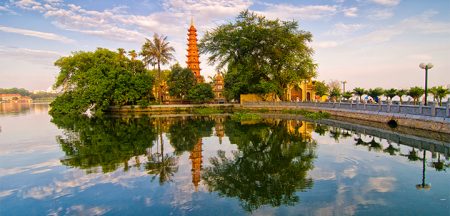Tailor Made Holidays with our travel experts
We'll do our best to call you within 48h

Vietnam’s capital, Hanoi, is regarded as one of Asia’s loveliest cities, with scenic parks and lakes, tree-lined boulevards and history-drenched architecture. Despite increasing development, this ancient city still retains a unique identity and cultural traditions. Take a city tour discovering Hanoi’s hidden parts on vintage Russian Minsk motorbikes, guided by a professional rider. En-route, glimpse magnificent architectural legacies of the French-Colonial era, including the iconic Opera House, built in 1911. Drive along narrow backstreets, stopping at Vietnam’s biggest second-hand mechanics and electronics market. Later, drop-in at a Hanoian family apartment, home to a Vietnam war veteran, with a rare opportunity for cultural exchange over tea. Later, sample Hanoi’s world-acclaimed street food.
Beyond Hanoi’s metropolis, head out to the Red River Delta and Hung Yen Province for Nom, a two-centuries-old village that has remained relatively unchanged over the ages. During our time in this quaint village, explore the local market and lakeside pagoda. As we cycle along the red brick streets shaded by mature Banyan trees, our guide will point out typical features of northern Vietnamese villages. Nom’s distinctive ancient architectural runs to a finely carved arched gate, village well and an uncommon stone bridge. Drop-in at a traditional ancient house to meet a local family, where we learn more about Nom Village culture and its age-old traditions.
A three-hour drive out of Hanoi brings us to Mai Chau, located in Hoa Binh Province. Mai Chau is known for its stunning backdrop of mountains and idyllic valleys filled with picturesque rice paddies. The rustic villages and traditional wooden stilt houses that constitute Mai Chau are inhabited mainly by the White Thai ethnic group. At the heart of Mai Chau, trek around Kha Lake, en-route passing several White Thai villages, which emanate a timeless quality. During the day, most of the White Thai residents are invariably away from home engaged in rural activities. During our trek, we get a rare opportunity to engage with the locals. Later, at a forest village, we meet an ethnic Thai family, where we can see first-hand local minority culture and traditions.
We make the five-hour drive to remote Son La Province, bordering Laos to the south. This breathtaking, rugged mountainous region is one of Vietnam’s most ethnically diverse, home to more than 30 different minority groups. Make a stop at Moc Chau, well-known for its highland tea plantations, where we have an opportunity to trek down to hill-tribe villages. Later, we arrive at the same-name provincial capital of Son La. This sleepy town was once the site of a sizeable French garrison during the French Indochina war. Due to the area’s harsh climate and remoteness, the French also established a prison here. Nowadays, Son La is expanding rapidly as Vietnam aims to bolster the population in this northernmost region.
In the morning, visit the old prison, now in ruins but housing the Son La Prison Museum. Dedicated to celebrating the achievements of its former prisoners, this small museum is a poignant reminder of former French colonial rule. Afterwards, embark on four-hour drive to Dien Bien Phu, along winding, steep roads cutting through stupendous scenery of terraced rice fields and forested mountains. Stop at Pha Din Pass and a Blue H’mong hill-tribe village, before arriving at provincial capital, Dien Bien Phu, formerly one of Vietnam’s largest opium-producing regions. Dien Bien Phu is however better known for its namesake decisive battle and defeat of the French by the Viet Minh in 1954, during the First Indochina War. Early evening, drive to Men Hamlet to engage with the Thai ethnic minority people.
Following breakfast at hotel. Visit all famous sites of the war in Dien Bien Phu before taking the flight back to Hanoi. End of our service